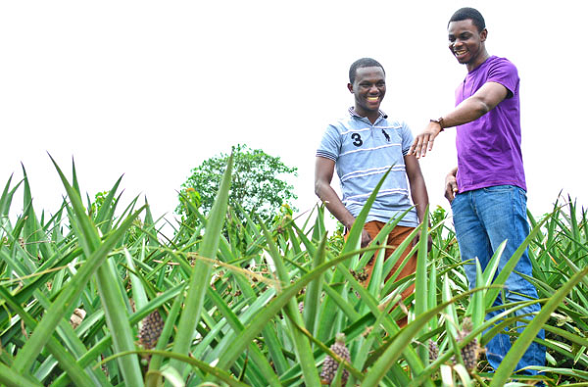-
About
- Our Work
- Get Involved
- Stay Updated
Growing the Future

October 20, 2007 will forever be in my history book. The day marks the moment of truth of my life. It was a sunny day. My family had just returned from farm very early this time. By12:00pm, the family was already home. Very unusual of the African farmer isn`t it? Don`t mind me! I mean I was expecting them in the evening around 6 to 7pm. I asked my dad where my brothers and sisters were. As usual of men, he was brave and could handle the situation so he came home first. He told me my brothers were on their way home. You can guess my next question right? Before I ask why they came back so early, my dad raised his tone on me to get him water. I hope you are not surprise. My dad is African. I was inpatient to know why so I went out to meet my brothers. To my surprise, my sister was crying. I went to her to find out why they came back so early. She said bush fire burnt the whole farm. Bush fire setup by hunters had consumed the farm. We were left with no other option than to borrow food from neighbors and pay-back later in subsequent seasons.
As a child, I was not comfortable with the situation. Seeing my family take food from my friends’ families was unbearable for me. In the subsequent seasons, I took it upon myself to guard our farm from bush fires. I would go to the farm every day after school. The family was cultivating maize, cassava, yam and groundnut on a large plot of land. I noticed my father apportioned the land for each crop and cultivated the same crop on each portion yearly. It was then I realized I could do more than just be a guardian of the farm for I had just learnt about crop rotation in school.
I knew the method my dad was practicing was not good for the fertility of the soil and the productivity of the farm. I advised my dad to rotate the crops by doing maize-groundnut rotation and cassava-yam rotation. This boosted our yield that season for maize harvested was increased from 35 bags to 42 bags. I can`t remember the number of acres we planted. Other farmers in the community adopted the system and I was moving from farm to farm helping people rotate their crops. This was where I developed interest in farming and henceforth became an active participant in my family`s farm and agriculture in general.
When I moved to Ashesi University, the interest grew for I was exposed to several opportunities in agriculture. I became involved in agricultural clubs such as Sea Mu.
While working with Sesa Mu, I participated in starting a model farm on campus. The farm exist to educate Berekuso pineapple farmers’ better ways of pineapple production. It also educates farmers about the value chain that exist in agriculture.
My experience at Sesa Mu paved way for me to participate in this year`s Africa Lead Leadership for change program in Ashesi university. The goal of the workshop was to inspire and mobilize innovative leaders, champions and thinkers, who are committed to creating new approaches in achieving food security. “The idea was to have a group of young leaders take up the mantle of leadership,” said Henry Cristal, facilitator at the workshop. It is important that we marry the skills and academic knowledge given to them in school with a sense of leadership. Africa Lead, similar to Ashesi, has a vision to train young leaders, with a focus on food security. If we have leaders who have the right skill and leadership to be able to deliver, it will help in being able to achieve food security.”
It was from this program I heard about YPARD which provides the platform for young people global both on-line and off-line to realize their full potential and contribute towards innovative agricultural development. Before I became an YPARD member, though I feel I was deeply involved in agriculture, I didn't feel that I knew very much beyond my experiences. I am now aware of some of the many challenges agriculture faces. I have noticed that almost everything we do can be traced to agriculture, and the general public needs to know and appreciate this. I want to help ensure that the importance of agriculture is known, and YPARD is the place to start.
Ever since I became an ypardian, I`ve been working to facilitate agricultural information to the public. But the only way I contribute is by sharing or retweeting information on either facebook or twitter which is why I want to be part of the social media boot camp in Rome. I believe social media can be used to sell the agricultural industry. It can be used to encourage more people to interact with farmers and get their questions answered about farming. Especially when data or information has become very important for the industry. People need to disseminate, share and exchange agricultural information for the general knowledge of the public.
This blog post is part of the CFS 43 YPARD social reporters' project supported by GFAR . The content, structure and grammar is at the discretion of the author only.
Tags:About the author
Related Posts
Comments
No comments made yet. Be the first to submit a commentBy accepting you will be accessing a service provided by a third-party external to https://ypard.net/
Get in touch
Email: [email protected]
YPARD Global Coordination UnitHosted by AGRIDEA and the Czech University of Life Sciences Prague
Lausanne, Switzerland and Prague, Czech Republic - Our Work


